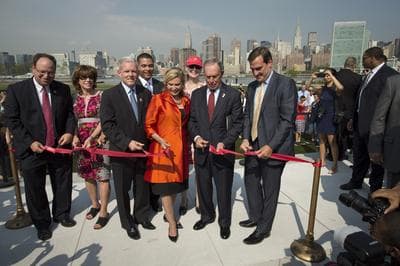Advertisement
How Mayors Became Our Best Problem Solvers
ResumeMayors of cities and towns as the new American policy pioneers. Doing it locally.

Mayoral races in the news from Boston to New York to Detroit, Houston and Seattle this season. And more than ever, we’re told, they matter. National politics and policy are gridlocked, paralyzed. States are broke. Americans are looking closer to home – local, locavore – for food, music, artisan creation of all kinds. And now maybe for social and economic policy, too. Ambitious mayors are looking to create their own way, solve their own problems. Up next On Point: Taking it local. Cities, towns and mayors as the new pioneers of American public policy.
-- Tom Ashbrook
Guests
Jennifer Bradley, fellow at the Brookings Metropolitan Policy Program and co-author of The Metropolitan Revolution: How Cities and Metros Are Fixing Our Broken Politics and Fragile Economy with Bruce Katz. (@JBradley_DC)
Benjamin Barber, Senior Research Scholar at the Center on Philanthropy and Civil Society, Founder and President of CivWorld at the City University of New York and author of the forthcoming "If Mayors Ruled the World: Dysfunctional Nations, Rising Cities." (@BenjaminRBarber)
From Tom's Reading List
New York Times: I Want to Be a Mayor — "In fact, if you want to be an optimist about America today, stand on your head. The country looks so much better from the bottom up — from its major metropolitan areas — than from the top down. Washington is tied in knots by Republican-led hyperpartisanship, lobbyists and budget constraints. Ditto most state legislatures. So the great laboratories and engines of our economy are now our cities."
NextCity: The Virtues of Corruption — "In an interdependent world where sovereign nation-states often seem dysfunctional when it comes to international cooperation, cities may have a new and influential role to play. That, if indeed, mayors and those they represent were in charge, we might actually find ways to resolve democratically some of our global problems. It is hard to imagine we can go on confronting a 21st century world of interdependent challenges in crime, environment, security, immigration, markets and war while we are deploying 18th century nation-state solutions that have long since ceased to work."
FastCompany : Dynamic Duos: Michael Bloomberg And Janette Sadik-Khan On The Future Of Walking, Biking, And Driving — "The innovators are the ones with their arrows in their backs, as the euphemism goes. If there is an instant referendum in advance on everything, you’re never going to do anything. And one of the dangers is, particularly with elected officials who have no knowledge of technology, they will say, oh my god, we had 10,000 people write me yesterday saying they don’t like that bike lane. Yeah, it’s one kid with a computer, and he bought the friends on Google."
Excerpt from 'The Metropolitan Revolution: How Cities and Metros Are Fixing Our Broken Politics and Fragile Economy' by Bruce Katz and Jennifer Bradley
This program aired on September 16, 2013.